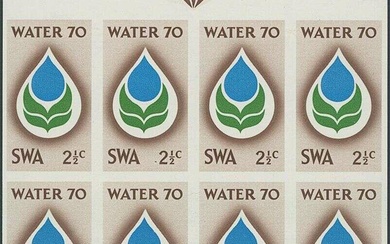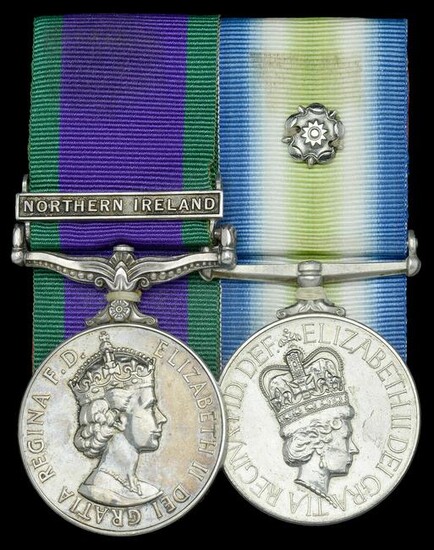Campaign Groups and Pairs
Pair: Lance Sergeant G. ‘Scooter’ Evans, Welsh Guards, who was wounded whilst on the Sir Galahad, 8 June 1982, and was recorded as having been previously wounded during a tour in Northern IrelandGeneral Service 1962-2007, 1 clasp, Northern Ireland (24414715 Gdsmn G Evans WG); South Atlantic 1982, with rosette (24414715 Cpl G Evans WG) mounted as originally worn, generally very fine or better (2) £1,000-£1,400---Graham ‘Scooter’ Evans enlisted in the Welsh Guards in February 1976. He served with 3 Company, Welsh Guards and received burns to his hands and face when the RFA troopship Sir Galahad was bombed at Bluff Cove, 8 June 1982. He was interviewed as part of an article that appeared in The Independent, 6 June 1998:‘As a former lance-sergeant in the Welsh Guards, he will again be reliving the moment at 5:00 p.m. on 8 June 1982 when a 500lb Argentinian bomb hit the troopship Sir Galahad. In that moment and its immediate aftermath, 51 of his comrades died in one of the most horrific and tragic incidents of the Falklands War. “Air Warning Red! Air Warning Red! Then BOOM!’ Graham says. We are sitting in his kitchen but he sounds a long way off. “Boom!... Boom!”He was standing with the section he commanded on the main “tank deck” in the bowels of the ship, orders issued and fully loaded with kit and ammunition, still waiting after nine hours to be taken off by landing craft. He had just gone to talk to one of his officers, a captain and ex-regimental sergeant major known as “Chalky” White. “A very important man,” says Graham. “I went up to Chalk and I said, “Scuse me sir, we’ve been on this ship too f***ing long.’ Then we got the ‘Air Warning Red’. I looked at Chalky, he looked at me, and we knew, we just knew, there was something going down. Crazy. I just went for my rifle and then ‘Boom!’ Hell on earth.”Graham was blown about 30 feet backwards through the air. “I remember thinking to myself, “F***ing hell. I’m the best soldier in the world. How can anyone do this to me?” But he fared better than the mortar platoon which was assembled in front of his own section on the deck where the bomb struck. They were just blown apart or “fried” where they stood. “People don’t understand what happens when a bomb hits like that. People don’t just die, they are blown all over the place, smashed against bulkheads, just smashed, smashed,” says Graham. “And the men screaming. God, Jesus Christ, you don’t ever want to hear a man scream like that. And there were 30 men screaming. I’m not an uneducated man, but I just can’t find a word for it. There was mayhem and total chaos, yes, but nothing can describe what it was there. It wasn’t fear. It was something beyond fear.”He’d been around a lot before that, he says. He’d been wounded during his first tour in Northern Ireland, and another man had been killed. He’d done and felt lots of things. “But nothing, before or since, has moved me like that split second of just seeing those men die.”Evans was diagnosed with PTSD, and:‘Guilt was among the first wave of emotions that hit Graham when he was lying aboard the hospital ship with third-degree burns to his hands and face, on his way home. He knew then, he says, that his army career was effectively over.Once back with the regiment he found himself able to carry on, initially with success, and he served for another five years. He was actually awarded the prize for being the best section commander in the battalion for two years running. But as his condition worsened he found himself increasingly in trouble for offences associated with drinking and insubordination. As his downward spiral gathered pace, he lost both his marriage and stage by stage, his position in the regiment... He spent his last 28 days of a distinguished 12 year army career in military prison, reduced to the rank of guardsman....Back in ‘civvy-street’, he quickly picked up a conviction and two years in prison for robbing someone at knife-point. Once out again, he lived rough for two months under the arches at Charing Cross station and sold the Big Issue to keep him in drink. It was only after a friend from army days, also a diagnosed PTSD sufferer, found him that things started to look up. His disorder was finally recognised, and he spent six months in a psychiatric institution and managed to straighten himself out to some extent. He got married again last year, and now lives in a council house in Peterborough on a war pension and disability benefits. His troubles, however, are still far from over.’ Sold with copied research, including a photographic image of the recipient talking to HM The Queen when she visited the wounded at the Cambridge Military Hospital, Aldershot.------For more information, additional images and to bid on this lot please go to the auctioneers website, www.dnw.co.uk
[ translate ]View it on
Estimate
Time, Location
Auction House
Pair: Lance Sergeant G. ‘Scooter’ Evans, Welsh Guards, who was wounded whilst on the Sir Galahad, 8 June 1982, and was recorded as having been previously wounded during a tour in Northern IrelandGeneral Service 1962-2007, 1 clasp, Northern Ireland (24414715 Gdsmn G Evans WG); South Atlantic 1982, with rosette (24414715 Cpl G Evans WG) mounted as originally worn, generally very fine or better (2) £1,000-£1,400---Graham ‘Scooter’ Evans enlisted in the Welsh Guards in February 1976. He served with 3 Company, Welsh Guards and received burns to his hands and face when the RFA troopship Sir Galahad was bombed at Bluff Cove, 8 June 1982. He was interviewed as part of an article that appeared in The Independent, 6 June 1998:‘As a former lance-sergeant in the Welsh Guards, he will again be reliving the moment at 5:00 p.m. on 8 June 1982 when a 500lb Argentinian bomb hit the troopship Sir Galahad. In that moment and its immediate aftermath, 51 of his comrades died in one of the most horrific and tragic incidents of the Falklands War. “Air Warning Red! Air Warning Red! Then BOOM!’ Graham says. We are sitting in his kitchen but he sounds a long way off. “Boom!... Boom!”He was standing with the section he commanded on the main “tank deck” in the bowels of the ship, orders issued and fully loaded with kit and ammunition, still waiting after nine hours to be taken off by landing craft. He had just gone to talk to one of his officers, a captain and ex-regimental sergeant major known as “Chalky” White. “A very important man,” says Graham. “I went up to Chalk and I said, “Scuse me sir, we’ve been on this ship too f***ing long.’ Then we got the ‘Air Warning Red’. I looked at Chalky, he looked at me, and we knew, we just knew, there was something going down. Crazy. I just went for my rifle and then ‘Boom!’ Hell on earth.”Graham was blown about 30 feet backwards through the air. “I remember thinking to myself, “F***ing hell. I’m the best soldier in the world. How can anyone do this to me?” But he fared better than the mortar platoon which was assembled in front of his own section on the deck where the bomb struck. They were just blown apart or “fried” where they stood. “People don’t understand what happens when a bomb hits like that. People don’t just die, they are blown all over the place, smashed against bulkheads, just smashed, smashed,” says Graham. “And the men screaming. God, Jesus Christ, you don’t ever want to hear a man scream like that. And there were 30 men screaming. I’m not an uneducated man, but I just can’t find a word for it. There was mayhem and total chaos, yes, but nothing can describe what it was there. It wasn’t fear. It was something beyond fear.”He’d been around a lot before that, he says. He’d been wounded during his first tour in Northern Ireland, and another man had been killed. He’d done and felt lots of things. “But nothing, before or since, has moved me like that split second of just seeing those men die.”Evans was diagnosed with PTSD, and:‘Guilt was among the first wave of emotions that hit Graham when he was lying aboard the hospital ship with third-degree burns to his hands and face, on his way home. He knew then, he says, that his army career was effectively over.Once back with the regiment he found himself able to carry on, initially with success, and he served for another five years. He was actually awarded the prize for being the best section commander in the battalion for two years running. But as his condition worsened he found himself increasingly in trouble for offences associated with drinking and insubordination. As his downward spiral gathered pace, he lost both his marriage and stage by stage, his position in the regiment... He spent his last 28 days of a distinguished 12 year army career in military prison, reduced to the rank of guardsman....Back in ‘civvy-street’, he quickly picked up a conviction and two years in prison for robbing someone at knife-point. Once out again, he lived rough for two months under the arches at Charing Cross station and sold the Big Issue to keep him in drink. It was only after a friend from army days, also a diagnosed PTSD sufferer, found him that things started to look up. His disorder was finally recognised, and he spent six months in a psychiatric institution and managed to straighten himself out to some extent. He got married again last year, and now lives in a council house in Peterborough on a war pension and disability benefits. His troubles, however, are still far from over.’ Sold with copied research, including a photographic image of the recipient talking to HM The Queen when she visited the wounded at the Cambridge Military Hospital, Aldershot.------For more information, additional images and to bid on this lot please go to the auctioneers website, www.dnw.co.uk
[ translate ]Estimate
Time, Location
Auction House
Similar Items

South West Africa Germany Login



